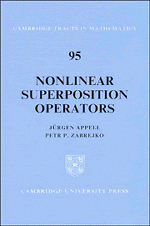Book contents
- Frontmatter
- Contents
- Preface
- Chapter 1 The superposition operator in the space S
- Chapter 2 The superposition operator in ideal spaces
- Chapter 3 The superposition operator in Lebesgue spaces
- Chapter 4 The superposition operator in Orlicz spaces
- Chapter 5 The superposition operator in symmetric spaces
- Chapter 6 The superposition operator in the spaces C and BV
- Chapter 7 The superposition operator in Hölder spaces
- Chapter 8 The superposition operator in spaces of smooth functions
- Chapter 9 The superposition operator in Sobolev spaces
- Bibliography
- List of Symbols
- Subject Index
Chapter 2 - The superposition operator in ideal spaces
Published online by Cambridge University Press: 05 February 2012
- Frontmatter
- Contents
- Preface
- Chapter 1 The superposition operator in the space S
- Chapter 2 The superposition operator in ideal spaces
- Chapter 3 The superposition operator in Lebesgue spaces
- Chapter 4 The superposition operator in Orlicz spaces
- Chapter 5 The superposition operator in symmetric spaces
- Chapter 6 The superposition operator in the spaces C and BV
- Chapter 7 The superposition operator in Hölder spaces
- Chapter 8 The superposition operator in spaces of smooth functions
- Chapter 9 The superposition operator in Sobolev spaces
- Bibliography
- List of Symbols
- Subject Index
Summary
In this chapter we are concerned with the basic properties of the superposition operator in so-called ideal spaces which are, roughly speaking, Banach spaces of measurable functions with monotone norm. To formulate our results in a sufficiently general framework, we must introduce a large number of auxiliary notions which will be justified by the results in concrete function spaces given in subsequent chapters; we request the reader's indulgence until then.
First, we give conditions for the local and global boundedness of the superposition operator F between ideal spaces X and Y which are typically ensured by special properties of the “source space” X. Second, special properties, such as absolute boundedness and compactness, are treated. Afterwards, we give conditions for the continuity and uniform continuity of F which are now typically ensured by special properties of the “target space” Y. For example, F is “always” continuous if Y is regular, and “never” continuous if Y is completely irregular (see the definitions below).
Weak continuity of F between ideal spaces is also considered; here we mention the surprising fact that, loosely speaking, only linear superposition operators are weakly continuous.
Next, we give necessary and sufficient conditions under which F satisfies a Lipschitz or Darbo condition. It turns out that in many spaces these two conditions are in fact equivalent.
Finally, the last part of this chapter is concerned with differentiability conditions for the superposition operator between ideal spaces.
- Type
- Chapter
- Information
- Nonlinear Superposition Operators , pp. 39 - 88Publisher: Cambridge University PressPrint publication year: 1990

